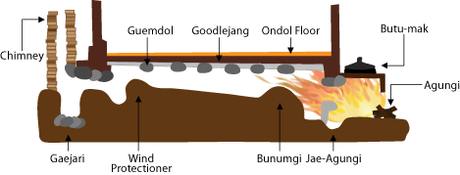An ondol, also called gudeul, in Korean traditional architecture, is underfloor heating which uses direct heat transfer from wood smoke to the underside of a thick masonry floor. In modern usage it refers to any type of underfloor heating, or a hotel or sleeping room in Korean (as opposed to Western) style.
The main components of the traditional ondol are a firebox or stove (agungi; 아궁이) accessible from an adjoining (typically kitchen or master bedroom) room, a raised masonry floor underlain by horizontal smoke passages, and a vertical, freestanding chimney on the opposite exterior providing a draft. The heated floor is supported by stone piers or baffles to distribute the smoke, covered by stone slabs, clay and an impervious layer such as oiled paper.
This Korean architectural element is similar to the kang bed-stove found in nearby modern-day Northeast China, historically known as Manchuria, which is used in and constructed similarly to the ondol.

Ondol had traditionally been used with a living space for sitting, eating, sleeping and pastimes, in most Korean homes before the 1960s. The furnace burned mainly rice paddy straws, agricultural crop waste, biomass or any kind of dried firewood. For short-term cooking, rice paddy straws or crop waste was preferred, while long hours of cooking and floor heating needed longer-burning firewood. Unlike modern-day water heaters, the fuel burning was either sporadically or regularly done (two to five times a day), dependent on frequency of cooking and seasonal weather conditions.
With the traditional ondol heating, floor spots closer to the furnace were normally warm enough with warmer spots reserved for elders and honored guests. Ondol had problems such as carbon monoxide poisoning resulting from burning coal briquette, and environmental pollution. For these reasons, other technology heats modern Korean homes.

Log in to write a comment